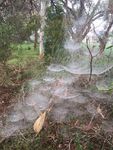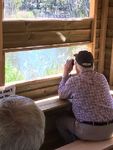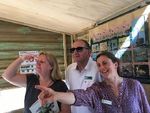Open Day - 18 October 1-4.30pm - Urrbrae Wetland Learning Centre
←
→
Page content transcription
If your browser does not render page correctly, please read the page content below
Spring 2020
Friends of Urrbrae Wetland
Open Day - 18 October 1-4.30pm
Sanctuary for a family
The Wetland is looking terrific and well worth visi4ng. outing in COVID 19
times
To ensure you have a great experience, we have upgraded four different paths and
developed informa4on sheets for each one so you can walk and learn as you explore.
We are s4ll going to be around to answer your ques4ons, but informally around the Covid 19 has impacted on us at the
property. Urrbrae Wetland. The restric4ons
have meant we have had to
What’s there to see? The recently launched impressive new bird hide will be open for introduce changes to how we
visits. Bring your binoculars to view the local bird life on the ponds. Who knows, you normally run our Open Days.
may even spy the shy Nankeen night heron in the reeds, or find a family of parrots in
the newly installed bird boxes perched high in the trees. Our next Open Day will be Sunday,
October 18 and we hope to see you
The Bee Hotel is completed, and you are invited to check its occupancy rate, and all there to enjoy spring at the
guess who might be rearing larvae there. Wetland.
We have finished our seedling plan4ngs for this year, and you can check how well
they are growing within their protec4ve coverings - and judge whether we made the
right choices of loca4on!
The grand opening of our bird hide was quite
an event. The Mayor, Heather Holmes-Ross,
came to cut the ribbon, and several notables
were also present, most especially, a founding
member of the Wetland, Graham Kernick.View from the Chair
This being my first report, I must We se^led into the old TAFE classroom Weeding has now become the main task.
thank Jim for his great leadership which replaced the original room, Some areas have been sprayed with
during the last 5 years. The group following its removal to allow for the new Roundup or Slasher, while in larger areas
con4nues to enjoy coming on toilet block to be constructed. the Whipper-snipper has been used.
Tuesday mornings, enjoying one Next year we will compare the
COVID 19 virus restric4ons prevented us
another’s company and comple4ng effec4veness of the two sprays.
from coming to the Wetland on Tuesday
various tasks. Cardboard and mulch retardant has also
mornings, much to our disappointment.
been trialled. These processes do not
Prior to the COVID 19 closure, we Thankfully the restric4ons were par4ally
replace the hand weeding, which we
were busy: liaed quickly and fully liaed soon aaer.
have all been doing.
• The bird hide was completed We immediately began plan4ng a variety
A number of Urrbrae High School
of species following the procedure we tried
students have been involved in Wetland
• Jim began building the bee hotel. with grasses at the front gate, which was
projects. Now completed, this program,
successful with a high survival rate -
• Path signs placed & look great. supervised by Vanessa offered the
considering the poor soil in that area.
students an opportunity for hands on
• Adelaide University Rotaractors Jim completed the Bee Hotel. We hope the experience in the Wetland.
helped us install the 16 bird boxes. occupancy rate increases during the spring.
Thanks to Kevin for making these. It is great to be back. David.
Lee created the Creek path.
An Interesting Patch
This special little part of the Wetland,
The main plant is the Small-leaved mallee pea,
just off the main track, keeps me intrigued.
Eutaxia microphylla, a low ground cover with
During the hot summer, it can be very 4ny yellow flowers. But the real treasures are
bare, but if condi4ons are right, it changes, the li^le green rose^es of leaves of
so I go back oaen to check. At the top of Maroonhood orchid Pterostylis pedunculata,
the photo is a spiky plant, the Blue Devil, which appeared first three years ago at this
Eryngium ovinum. It dies down in autumn, 4me.
but emerges late winter, and if we are very
I'm hoping there will be flower stalks rising from them soon. Will let you
lucky in December it will have bright blue
know if I see either of these special plants in flower! Chris Adams
flowers similar to thistle flower heads.
2Do lizards lay eggs or
give birth to live young?
As you can see from our photos, we found
some eggs in a mound of mulch and it’s
opened a can of worms - or of lizards - and
some very interesting facts.
Could our eggs be lizards’?
Obituary
Evolution has been caught in the act, Another skink in SA has also been
It is with great sadness that we
according to scien4sts decoding how a shown to be bimodal. Bougainville’s
mark the passing of Graham
species of Australian lizard is abandoning skinks give birth to babies on Kangaroo
Kernick (pictured below with Don
egg-laying in favour of live birth. Island, while on the mainland they lay
Buick last year) who was such a
eggs. (The Guardian, April 2019.)
force in the early development of
Along the warm coastal lowlands of NSW
So who laid our egg nest? Certainly we the Wetland and a constant
the yellow-bellied three-toed skink lays
have families of skinks on the site, and supporter of our work as it
eggs to reproduce. But individuals of the
Blue-Tongues have been sighted at the evolved, and as the Wetland
same species living in the state's colder
Wetland previously. established its own ecosystem. He
mountains mainly give birth to live young.
and his family were welcome
Evolu4onary records show many rep4le Ma4ng for most blue-tongues begins in a^endees at our Christmas
making the transi4on from egg-laying to late winter through to December. If you celebra4ons for many years, and
live birth, and today about 20 percent of see two blue-tongues looking like he would always take a turn
all living snakes and lizards give birth to they're having a vicious fight, it's most around the ponds to refresh his
live young only. (from B Handwerk, likely ma4ng. They can be quite apprecia4on of this marvellous
NaIonal Geographic, Sept 2010). aggressive towards each other and can facility. It is a credit to him, and to
end up with cuts and scratches. other founding members, and we
Uni of Sydney researchers observed a appreciated his regular, informed
three-toed skink lay three eggs, and weeks The female blue-tongue gives birth to and gracious support.
later give birth to a live baby. live young three to four months aaer
ma4ng, which is very unusual in lizards
This is the first Ime that anyone has as they normally lay eggs. The babies,
observed live birth and egg laying in a who are able to look aaer themselves
single liLer … it’s very, very unusual, just four days aaer birth, can grow over
20 years to 50cm in length.
A Skink or a Blue tongue?
Skinks create nests in moist soil under
objects in the garden. Females lay
about five eggs each, some4mes in
communal nests which hold dozens of
eggs. Eggs look like mini chicken eggs
but are soa and rubbery. They become
enlarged as they absorb moisture from
the surrounding soil. Sourced from:
Graham, lea with volunteer Don Buick
backyardbuddies.org.au
3Focus on Volunteers
Chemical handling
workshop
In February most volunteers attended
this workshop arranged by Kat Hill
(Volunteer Coordinator, NRM) and
` facilitated by Dave & Peter, both very
knowledgeable in their areas.
Participants were from various bushland
around Adelaide. The result was an
A YOUNG WOMAN GOING informative and targeted session that
highlighted old and new practices at
PLACES the Wetland.
SHIVANI PRESTON
Key points for developing a Friends’
policy:
• Glyphosate was reinforced as safe if
“Having finished studying used as per directions
Conservation and Land • use multiple gloves to protect and
Management at TAFE last year, I keep from overheating Want to know more?
have some free time as I job- • note difference between poisonous
search. As I was familiar with and hazardous labels Wikipedia: en.wikipedia.org/wiki/
Urrbrae Wetland it seemed a good • do not to disturb the soil, as weeds Urrbrae_Wetland and search
use of my time and skills, and I will invade the area
could learn about wetlands ‘Urrbrae Wetland’
• brush cut before seed heads form
biodiversity first hand. • never allow seed heads, even Contact: David Gooley, Chair, for
immature green ones, fall to the informa4on:
I am hoping my volunteer work will ground, as they could germinate davley60@internode.on.net
help to prepare me for a practical • Slasher will kill weeds and only slow
contractor job with Trees for Life native grasses for one season Urrbrae Wetland Learning Centre:
or as a Ranger. The environment • mobile sprayers, sponge-ended
isn’t my only passion though. www.urrbraewetlandlc.org/
dabbers, tongs with sponges
attached - ways to apply poison. Site visits: Wetland Managers, Ann-
Also I’m involved in the Adelaide Louise Breeding & Vanessa
Arts community as a musician, Some individual plant advice: Greenslade 8274 7455
dancer, stage manger, and sound • Plantain (Plantago coronopus) - cut
tech. For example our family and swab with Glyphosate
performs the puppet show Punch & • Guildford grass (Romulea rosea) - Pictured: our two Wetland Managers
Judy in many festivals around SA.” use the ‘Tongs of Death’ with
sponges saturated with poison
• Chickweed (Stellaria media)- use
Slasher
• Soursobs (Oxalis pes caprae)—
Glyphosate - don’t hold your breath!
Currently we are absorbing/adapting
this advice and turning it into pilots of
different weed suppression methods.
STOP PRESS! We are sorry to lose
our wonderful supporter and advisor, New volunteers are welcome.
Volunteers enjoy the company of Drop by any Tuesday morning
Ann-Louise, who will be leaving to
between 9.00-11.00 to make contact.
others interested in the environment have her second baby soon.
4You can also read



























































